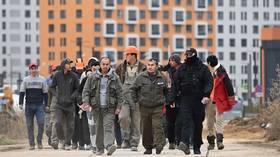Moscow to introduce smart ID cards for migrants

Moscow will begin issuing electronic identity cards next year for citizens from common-travel-area countries who come to the Russian capital, mayor Sergey Sobyanin has said.
Russia has visa-waiver programs with more than three dozen countries, including the Central Asian states from where most of the guest workers in the country come.
The smart ID cards for migrants will be introduced in the capital in 2025 as part of an ongoing trial, Sobyanin told TASS on Friday.
“All data will be uploaded to the electronic ID of a foreign citizen: when he arrived, what is his biometric data, where he works, where he is registered, and so on,” the mayor explained.
As part of the program, police will also be equipped with special reading devices to access information on the smart cards, the mayor stressed.
According to Sobyanin, the electronic identification cards are going to be the first thing that officers will be looking at when checking migrants’ documentation.
If the system displays a red light it means that the holder of the ID is on a wanted list or that they have violated the migration regime, he said. In such an instance, the police would detain that person, the mayor added.
Sobyanin said that, starting from next year and as part of a trial run, biometric data will be collected from citizens of visa-free partner states coming to Moscow by air. This database of the photographs and fingerprints of non-nationals is expected to make crime fighting more effective, he explained.
Russia’s Investigative Committee announced earlier this month that migrants had committed more than 26,000 crimes since the start of the year, with the number of violations by undocumented migrants having tripled, from 2,880 in 2023 to 8,059.
Non-nationals were also responsible for 73 extremist crimes, a 14% rise compared to last year. “Many of the visitors justify their radical attitudes with their religious beliefs. In addition, they often openly demonstrate a negative attitude towards the local population,” the agency noted.
According to Russia’s Ministry of Internal Affairs, there are currently some 6.2 million foreign citizens living in the country, of which an estimated 740,000 are there illegally.
In September, the ministry announced that it was putting together a registry of migrants that have no legal basis for staying in Russia. Those on the list, set to be brought into use next year, will be blocked from accessing a range of services in the country and will not be allowed to use banking services, to drive vehicles or to register property, among other restrictions.














